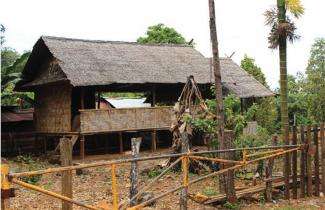Dongi Village's name is taken from the word Dongi, a local tree species with sour fruit endemic to the area around Luwu, South Sulawesi. The community in Dongi Village is called To Karunsi'e and comprise of three groups: To Karunsi'e Paepae, To Karunsi'e Sinongko, and To Karunsi'e Dongi. The term To Karunsi'e comes from the words karo meaning main and si'e meaning granary. Karunsi'e means main granary. To Karunsi'e land is fertile for cultivation of crops such as rice. For generations, the area has been known as the Granary of LifeThe area is also often referred to as, Witamorini, which means safe and fertile land.
To Karunsi'e harvest is abundant, and the rice granary is always full. During bumper years, the community is overwhelmed with their harvest from the valley's rice fields and, therefore, part of the harvest is left to rot. This area is known as Lembo Moboo, which means valley of rotting harvest. To Karunsi'e is also known for their generosity and often share their harvest with other communities in the area, including the Rahampu'u people in Matano. In the past, planting rice involved a ritual called Muntasu where the communally clears land, releases chickens into the wild, and makes an offering of betel leaves.
This customary rule is no longer practiced. We are trying to revive this tradition, said Yunus Ambeta, a community figure in To Karunsi'e Dongi.
The rituals being revived are muntasu, a ritual before planting rice, and medoi tokuni, or a process of decision making where the finality of the result is symbolized by the throwing away of a passapu, a traditional head band.
Similar to the experiences of indigenous peoples across the archipelago and much of the world, colonization in this case, by the Dutch in 1870 destroyed To Karunsi'e. The people left Lembo Moboo and moved to surrounding areas including Laawewu, Kaporesa, and Balobalo. In 1910, the people residing in Laawewu moved to Solonsa constructed Old Dongi Village. At the time, To Karunpi'e lived along Matano Lake in Tapulemo and Pontadaa Villages. In the 1920s the villages were united by the Head of Nuha District, Andi Halu, into one village called the New Village. That site, sadly, no longer exists, having been converted into a golf course by PT INCO.
According to the Mohola (tribal head) Bally Pombuh, during Dutch Colonial times, To Karunsi'e consisted of Kaporesa, Dongi, Paepae, and Sinongko Villages. Before PT INCO's operations in 1948, a German company called NNC controlled the To Karunsi'e nickel mines for three years. These mines finally closed in 1950 due to security concerns. The workers at the time were Soroako and Dongi people.
After Indonesian Independence, unrest from the Darul Islam/Islamic Armed Forces of Indonesia (DI/TII) was prevalent through the 1950s in South Sulawesi under Abdul Kahar Mudzakkar. This rebellion forced To Karunsi'e to leave Old Dongi, the land of their ancestors, and fled to Soluro. In 1957 the exodus continued to Malili, Towuti, and Morowali in Central Sulawesi and Masiku and Routa in Southeast Sulawesi.
Bally Pombuh recalls the rebellion that destroyed their villages, including Dongi Village on October 24, 1958. Two years after, in an effort to begin the recovery process, To Karunsi'e returned to their ancestors' land in Dongi Village. However, the village had been converted into a golf course by PT INCO. The villages, rice fields, farmlands, and indigenous forest were then transferred under the control of a Canadian nickel mining company. After the fall of the New Order regime in 1998, the To Karunsi'e again organized to reclaim Dongi Village. They returned to their land, stayed, and continue to build their dreams in the village they were forced to leave behind.
Source:
Andang, B, et.al., 2013. Menata Kampung: Tiga Komunitas Adat di Sulawesi, Membangun Potensi Menghadapi Dampak Perubahan Iklim. Published by JURnaL Celebes supported by The Samdhana Institute, Indigenous Peoples' Alliance of the Archipelago (AMAN) and Participatory Mapping Working Network (JKPP). Makassar: JURnaL Celebes.




